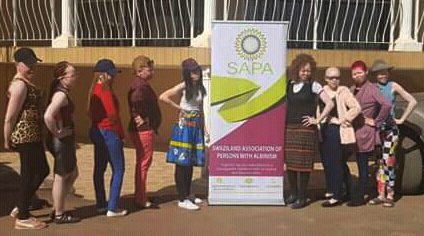As in many other African countries, the lives of people living with albinism in eSwatini are blighted by stereotypes, some of these putting them in mortal danger.
From stigmatisation and lack of access to skin essential products to inadequate government or corporate assistance and the omnipresent threat of falling victim to marauding gangs of ritual murderers, albinos in eSwatini often feel the world conspires against them.
For 18-year-old Sakhile Dlamini, an Accounts student at a tertiary institution in the capital Mbabane, life has not been a walk in the park – she was always made to feel as if not she is normal a human being and has constantly lived in fear of falling victim to ritualists.
Relating how she grew up with a feeling of inadequacy, Dlamini vividly remembers being bombarded with myths about her condition, including that she would disappear without trace into the mountains when she dies and her family would never give her body a proper burial.
“I only started being comfortable with my condition when I was in high school because my parents enrolled me in a private school where I learnt the biological logic behind the colour of my skin,” Dlamini says.
She however revealed that she has never stopped being frightened by threats of ritual murders anytime of the year.
“At some point my family wanted to take me to South Africa, but there too news of people living with albinism being hunted, abducted and killed started making headlines.”
For the vast majority, assimilation into society is as draining and discouraging as it is to eradicate racism. Society harshly treats people with albinism, often condemning them to the lifestyle of a hermit and avoiding mainstream human endeavours.
However, all that could be a thing of the past in the Kingdom of eSwatini in southern Africa.
Dlamini is one of the contestants in the forthcoming Miss/Mr Albinism Beauty Pageant being organised by the Swaziland Association of Persons with Albinism (SAPA) as part of efforts to pull down barriers that militate against the integration of albinos into society by raising awareness about their condition.
SAPA chairperson Philemon Gama said proposed pageant set for August 10 in the capital Mbabane is one of the initiatives by the association to raise awareness about the condition as well as to build self-esteem among people living with albinism.
About 20 contestants have been unveiled for the contest, who main objective is not only to show that people living with albinism are capable of anything, but also to educate people about the condition.
The eSwatini National Council of Arts and Culture (ENCAC) described the pageant as an opportunity for people living with albinism to build their confidence, learn about human rights in general and also raise awareness about issues that are affecting them.
“The ENCAC will give the contestants all the support they need, including cultural orientation to ensure they appropriately represent eSwatini at international competitions,” ENCAC chief executive Stanley Dlamini said.
Winners of the pageant will represent eSwatini at the southern African regional competition scheduled for October in Zimbabwe, according to Dlamini.
He said the young people will also share experience with their counterparts from other countries and get knowledge on how they solve challenges they are faced with and even equip themselves with skills on how to start income-generating businesses.
BM/jn/APA


